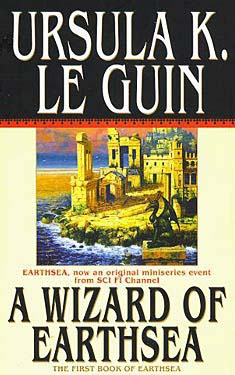Ursula K
LeGuin
Completed 10/30/2018,
Reviewed 10/30/2018
4 stars
“A Wizard of
Earthsea” is the first book in the Earthsea Cycle. It is a beautiful book about a young magician
coming to know himself. It was written
for a young adult audience before YA was a genre. But it is more than simply a YA novel. It’s themes of the hero’s journey, good
versus evil, and embracing the shadow self speaks to all ages. It is a fantasy novel without a war or some
other “us versus them” trope.
Duny is a young
goat herder on a small island in the Earthsea archipelago. Duny is his birth name. As he grows up, he shows a propensity for
magic under the tutelage of his aunt, a witch.
During this time, he comes to be known as Sparrowhawk. But neither Duny nor Sparrowhawk is his true
name. He only finds that out once he
becomes an apprentice to the local wizard.
Sparrowhawk however is impatient with the slowness of his studies, so
the local wizard sends him to a school for wizards (thirty years before Harry
Potter). There, on a dare, he awakens
the ghost of a long dead woman, which also unleashes an evil shadow into the
world of the living. His mission becomes
to find and conquer the shadow before it conquers him.
That is just
a barebones overview of the plot. It is
much more textured and nuanced than that.
In typical LeGuin form, the plot is not very exciting save for a battle
of wits with a dragon and an enchantress.
Like her much later “Annals of the Western Shore” novels (Gifts, Voices, and Powers),
it is heavy on world building and mood. There
is a lot of detail about the nature of magic and the power of words and
names. Magic takes energy and can take
its toll on the wielder. It should not
be wielded without understanding the implications of its execution. For example, stopping a storm in one place
can cause a flood somewhere else.
Regarding names, once you know the true name of something, it gives you
power over that thing. It’s all very
sophisticated and well developed for such a short book.
The prose is
interesting. It is sparse, but
beautiful. It’s one of those books where
you feel like nothing written could be thrown away. It isn’t full of similes to pad up the novel. LeGuin simply uses strong nouns and
adjectives.
Being such a
short book, there isn’t much character development except for the
protagonist. And even that is
minimal. We don’t really get into the head
of Sparrowhawk. His story is told almost
as if performed by a storyteller around a campfire, with a lot of exposition
and little dialogue. Still, it is easy
to relate to him as he succumbs to the prodding of a young girl, accepts a dare
to show off to his colleagues at wizard school, and wallows in despair as he
makes his journey to find the evil shadow.
It’s interesting to note that Sparrowhawk and most of the characters are
not white. LeGuin very subtly made the
characters people of color at a time when fantasy was dominated by European
derived races.
I give this
book four stars out of five. It’s a
classic from which many authors have gotten inspiration, like the Harry Potter
series and anything with a school for magic.
I read what was then just the Earthsea Trilogy back in college and loved
it. Rereading this first book, it felt fresh
as ever, despite the lack of women in the story. The second book’s protagonist is female,
though. I really look forward to reading
the rest of the cycle, which is now a total of six books.

No comments:
Post a Comment